Testimonies
Testimonies is a competition section dedicated to powerful documentary films which deal with important social, economic, environmental, and political phenomena.
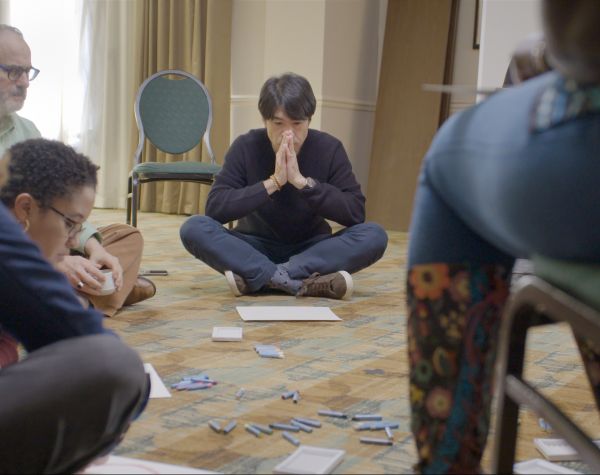
Climate in Therapy
This observational, documentary-comedy study presents a surreal encounter between leading global climatologists, climate scientists, and scientific authorities who are subjected to a facilitated meeting in a godforsaken hotel in New Jersey. This inverted team-building exercise aims to present academics as feeling human beings who, like millions of other people, experience climate grief and fear for planet Earth. The initially awkward emotional encounters lead to enriching conversations that focus not on disasters and numbers, but on experiences and emotional responses. The trajectory of helplessness, denial, hope, and acceptance is accompanied by humorous moments of human interaction. “This film shows that even those who are supposed to be doing something about climate change are allowed to share their feelings and uncertainty about the future.” — Sean Patrick Kelly
director: Nathan Grossman
original title: Climate in Therapy
country: Sweden, Norway
year: 2025
running time: 64 min.

Coexistence, My Ass!
Noam Shuster-Eliassi, an Israeli stand-up comedian with mixed roots, has become both a beloved and hated celebrity. She and her Palestinian friend Ranin were raised in the “friendship village” of Neve Shalom (Oasis of Peace) and presented to the world as an example of possible peaceful coexistence. The settlement has been visited by Hillary Clinton, Jane Fonda, and the Dalai Lama. But that's not enough for Noam—as an adult, she decides to make a real impact and fight for peace. Despite the power of politically incorrect humor, music, and social media, however, she finds that she is unable to eradicate her own country's dehumanizing war machine or the global view of genocide in Gaza.“The name of my show was born as a joke. As a way of coping with reality. I wanted to poke fun at the approaches to peacebuilding in the Middle East. It's more like a feel-good industry than lived reality. Many years after being nothing more than a childish advertisement for peaceful coexistence, I said enough is enough!”
director: Amber Fares
original title: Coexistence, My Ass!
country: United States, France
year: 2025
running time: 95 min.

Death of Death
Death as non-existence, non-being, or the absence of life has been a subject of human interest for millennia. Poets, philosophers, prophets, and hermits have now been replaced by filmmakers, influencers, cryonicists, and evolutionary biologists in the search for the quintessence of life and death. Zoltan Istvan runs a cryonics laboratory and is running for president of the United States with the demand that immortality be included among fundamental human rights. In Russia, a mass festival dedicated to the cult of death is traditionally held. Dāvis Sīmanis' film essay reveals the twists and turns of man's age-old desire for eternal life. It uncovers the metaphorical and fetishistic representations of death and the mechanisms by which we come to terms with our own mortality. „Immortality, anti-aging, fear of death. When I started the film, I just thought I’d learn how to live a little bit longer. But then things got weird. Scientists reviving pigs at Yale. People sticking neurochips in their heads. Bio-hackers giving out life-extending tips. The whole civilization is living in the age of transhumanism. And I am the only one who is left behind.“ — Dāvis Sīmanis
director: Davis Simanis
original title: Death of Death
country: Czech Republic, Latvia
year: 2025
running time: 67 min.
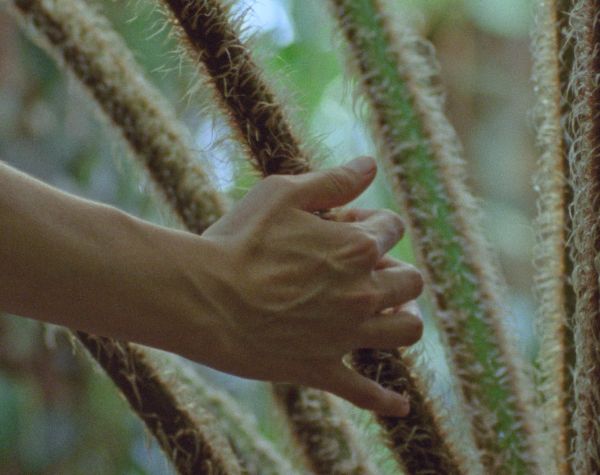
Estados Generales
The genealogical journey to discover the origins of exotic plant species begins in the Royal Botanic Gardens in Madrid. It was here that a mysterious box containing seeds from an expedition to South America in 1936 was found. The journey back in time and space to southern Peru involves uncovering layers of a turbulent past. Scientific knowledge and the cataloguing of flora helps explain the nature of colonial extraction of everything valuable and contributes to establishing at least partial justice and eradicating historical injustices. National heritage here functions as a non-obvious social construct that must be fought for and cared for in order to preserve its integrity. The ambient still life of the hacienda reveals the suspected brutality of the slave era. “The presence of the observer could never be neutral. Whether he is aware of it or not.”
director: Mauricio Freyre
original title: Estados Generales
country: Peru, Spain
year: 2025
running time: 75 min.
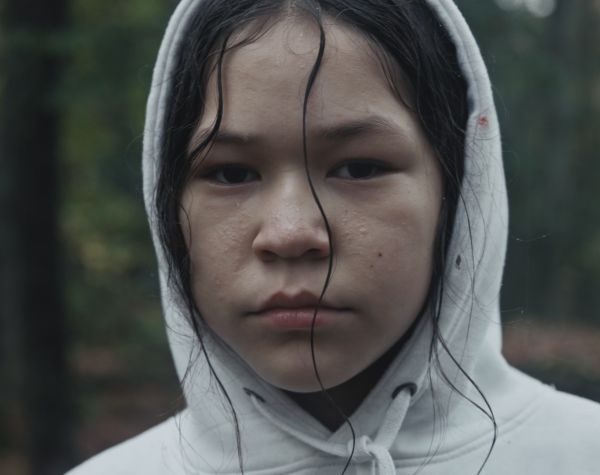
Forested Future
The Menominee tribe is connected to nature through their shared wisdom of caring for trees and forests. The revival of traditional logging methods and efforts to preserve permaculture freedom clash with the prevailing approaches of extensive logging for human needs. The complex topic of the relationship between human communities and forests is viewed from many perspectives – architects, loggers, teachers, economists, and activists explain our essential civilizational connection to trees as guardians of the landscape and memory. This educational documentary offers hope in the form of examples of natural recultivation and sensitive care. “When I talk about the environment, I am not talking just about dirty rivers or climate change or acid rain. I mean the people as well. Therefore, I am very interested in rural communities and how they live with their environment and what they gain from it. So it took me naturally to how we deal with the world’s forests.” — Fred Pearce, environmental journalist
director: Petr Krejčí
original title: Forested Future
country: United Kingdom, Czech Republic
year: 2025
running time: 90 min.
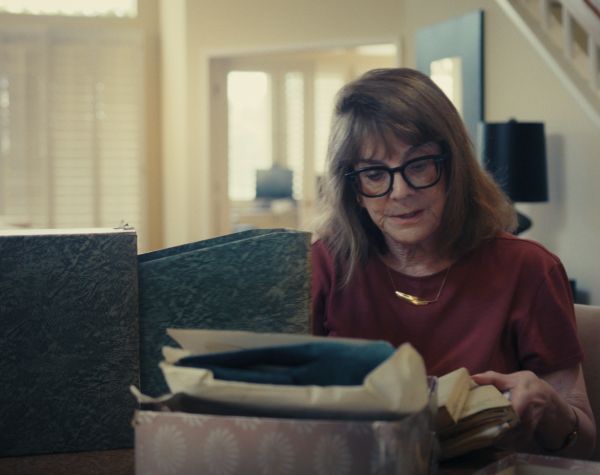
Memory Wars
American forensic psychologist Elizabeth Loftus is both reviled and admired as a legal expert on the unreliability of human memory. Her testimony, based on an analysis of the consistency of statements, has played a significant role in dozens of court cases where the reliability of human memory has influenced decisions on the guilt or innocence of perpetrators. As the words of testimony turn into images and images transform into memory, the witness's records become an unreliable analysis of the twists and turns of the human mind and its imagination. The documentary shows a personality torn between cultural wars and the struggle to define false memories, which are a common part of our memory and the “greatest hoax of the 21st century.” “Let me ask you something: Ted Bundy, the Hillside Strangler, Timothy McVeigh, OJ Simpson, the Menendez Brothers, Michael Jackson, Phil Spector, Martha Stewart, Jerry Sandusky, Bill Cosby, Harvey Weinstein. Do you actually believe that these individuals were victims of either false memories or bad identifications, your area of study? It's not my position to judge whether they are guilty or not, but there were memory issues in these cases.” — Elizabeth Loftus
director: Hendrik Löbbert
original title: Memory Wars
country: Germany
year: 2025
running time: 91 min.
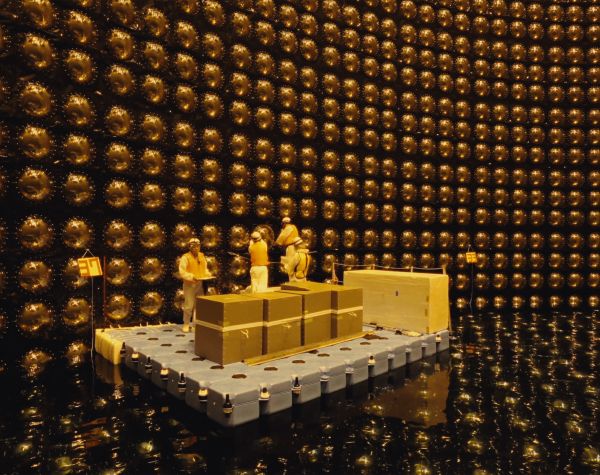
Messengers
Canada, Japan, Antarctica. Deep underground, scientific institutions have built gigantic telescopes designed to emit invisible particles and study the properties of objects smaller than atoms. The radioactive noise of neutrinos and its visualization offers a mesmerizing poetic immersion into the operation of complex devices and the subatomic depths of black holes. The abstract imagery of gigantic machines, reminiscent of a science fiction film, contrasts with the precise research of particle scientists. Meditative exploration leads us to essential questions that occupy the scientific, philosophical, and artistic communities: Why does matter exist rather than nothing? “Studying our own galaxy is like standing inside a forest and this is like looking at one from above. We can see deeper into the structure with infrared light, radio waves and X-rays, but from the outside, the black hole is still impossible to see.” — commentary from the film
director: Jeffrey Zablotny
original title: Messengers
country: Canada
year: 2025
running time: 45 min.
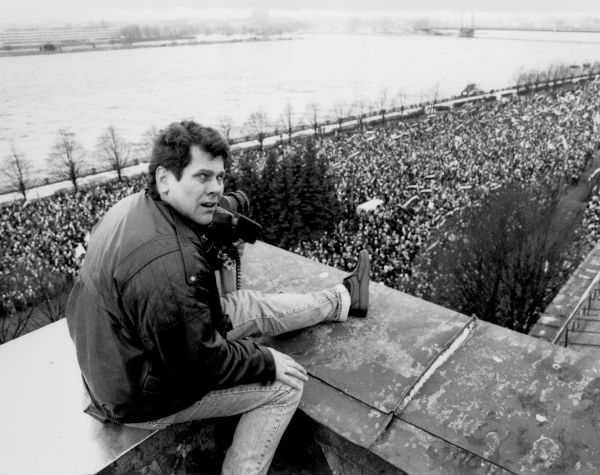
Podnieks on Podnieks. A Witness to History
Latvian documentary filmmaker Juris Podnieks (1950–1992) gained worldwide attention for his relentless need to “be there,” but also for his ability to capture unique moments of the pulsating present. This urgent documentary portrait, using personal diaries, photographs and film footage, presents the fascinating life journey of a filmmaker who reflects on his obsession but is unable to control it. The need to capture “the death of the monster”, the collapse of the Soviet Union and the Latvian struggle for freedom proved fatal for him and his long-time colleagues. The unclear circumstances of his death highlight the magnitude of the unfinished work of this leading figure in European documentary filmmaking. “In the West, they see it as a movie. They do not understand that in this ‘perestroika’, people’s destinies are being decided. And it is creating immense pain. We even call it an awakening, but nobody really wants to wake up.” — Juris Podnieks, 1987
director: Anna Viduleja, Antra Cilinska
original title: Podnieks par Podnieku. Laika liecinieks.
country: Latvia
year: 2025
running time: 128 min.
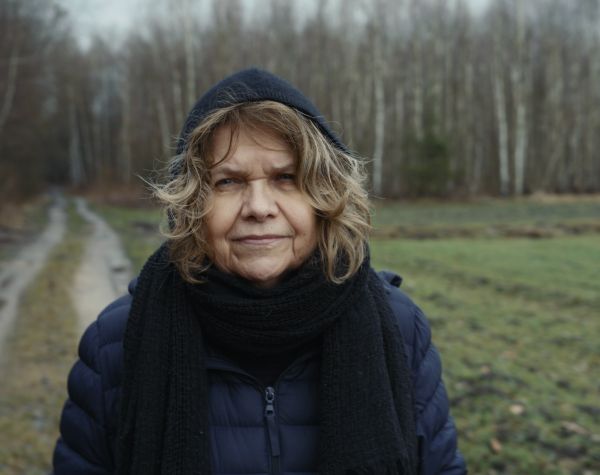
Poland versus History
In 2001, Polish historian Jan Tomasz Gross, who is of Jewish descent, published a book entitled Neighbors, which completely shattered the myth that had been built up over many years that the notorious pogrom in the village of Jedwabne in 1941 had been committed by Germans. The testimony of the sole survivor of this tragedy reveals the responsibility of loyal Poles during World War II, the flourishing trade in valuables in Treblinka, but also the passionate conceit of the majority of the Polish nation. Research into the past sheds new light on the pogroms in Radzilów and post-war Kielce in 1946 and shows that anti-Semitism is more deeply rooted than the conservative Polish elite are willing to admit. “I was a young girl when Jan T. Gross’s Neighbors was published at the very beginning of the 2000s. Among my family and the Polish diaspora in France, as well as in Poland obviously, the book created a sort of conflict, on several levels. Mostly because my family and their friends are very powerfully linked to Poland, often as democratic activists. Polish democracy was the goal of their dissident youth, the fight of their militancy in Poland or in the diaspora.” — Joanna Grudzińska
director: Joanna Grudzinska
original title: Pologne contre histoire
country: France, Poland
year: 2025
running time: 70 min.
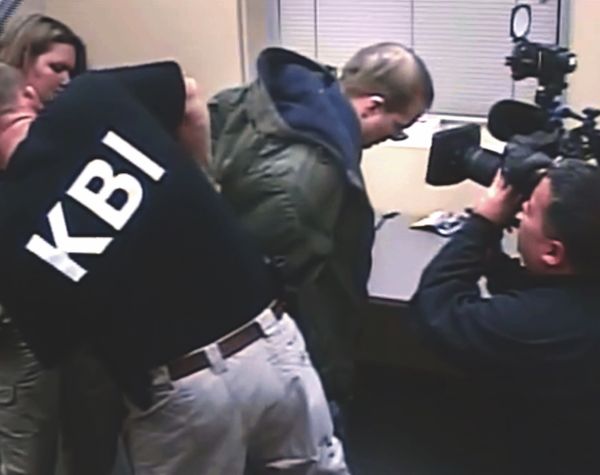
Predators
Between 2004 and 2007, NBC aired the controversial show To Catch a Predator, which caused an unprecedented stir in the US. The star of the show, host Chris Hansen, under the supervision of the crew, hidden cameras, and the police, entered scenes where traps for sexual predators had been carefully set up. Despite the initial wave of enthusiasm, the focus on sexual violence against young victims was gradually overshadowed by the emotional impact the show had on both the victims and the predators themselves. Their rehabilitation and repentance were drowned out by a media lynching that blurred the perceived line between reality and fiction and resulted in feelings of loneliness and misunderstanding, as well as loss of life. “People watched it, partly as a public service, and found schadenfreude, shock value and humour within that. It was much later in life that I began to find something worth interrogating about this show, but when it first came on I watched it, like many other teenagers did, with this mix of amazement and horror.” — David Osit
director: David Osit
original title: Predators
country: United States
year: 2025
running time: 96 min.
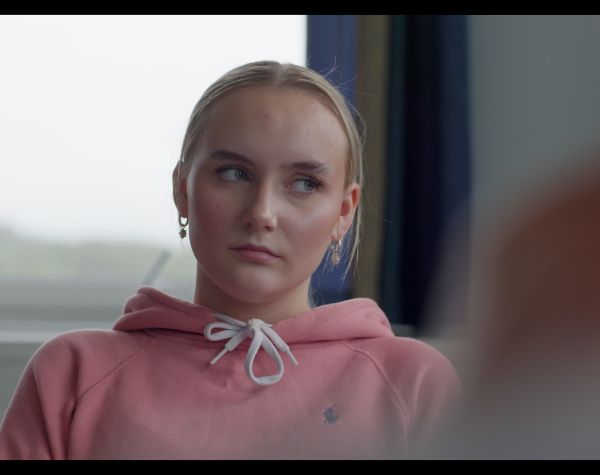
Teenage Life Interrupted
An unexplained epidemic of chronic fatigue, malaise, and limb paralysis is crippling the lives of dozens of Norwegian teenage girls. Two specialists from the University Hospital in Tromsø are offering an unusual treatment. Experienced paediatrician Hans Petter Fundingsrud and child psychiatrist Elin Drivenes are bucking the dominant trend of instant medication. They offer girls liberation from the captivity of social expectations and the web of social networks in the form of a holistic approach, sincere interest, and trust. The paths to recovery are underpinned by shots of the contemplative Norwegian landscape and the doctors' search for their own mental balance in their mentally demanding clinical practice. “It's not enough to tell these young people: we've examined you and found nothing wrong. That's like saying: you're not in any pain. You need to say: we've examined you and found nothing that can be operated on or treated, but we understand that you're in pain and we'll look into it.” — Hans Petter Fundingsrud
director: Åse Svenheim Drivenes
original title: Teenage Life Interrupted
country: Norway
year: 2025
running time: 90 min.
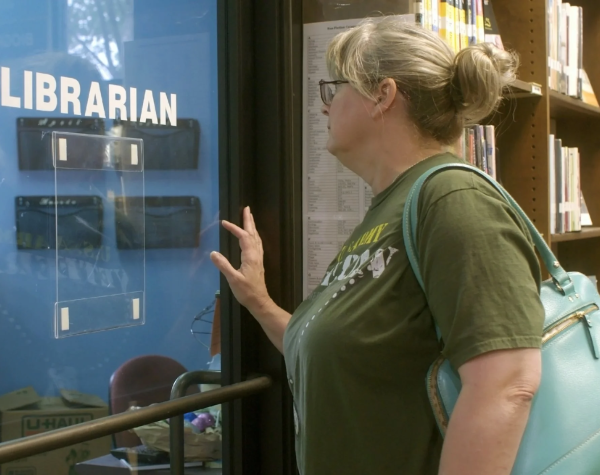
The Librarians
The inconspicuous profession of librarians takes on greater significance in critical situations, such as the creation of lists of banned books. The coordinated efforts of conservative political circles in Texas, the stronghold of sectarianism, turn into a perverse test of courage and personal integrity. Librarians find themselves at the barricades of free speech, sacrificing their own comfort and often even their personal safety and mental health. Gender and racial issues, sexual questions, and ambiguity in fiction and nonfiction serve as the spark for cultural wars, at the epicenter of which are women of resilient character and courage. “We can't remain silent, we can't be silenced. We can't remain anonymous. And they can't censor our voices, just as they want to censor the stories in those books.” — anonymous librarian from Texas
director: Kim A. Snyder
original title: The Librarians
country: United States
year: 2025
running time: 92 min.
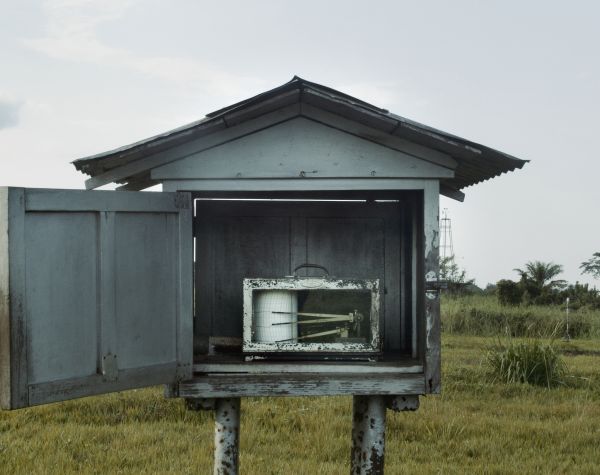
The Tree of Authenticity
The rainforests of the Congo, the second largest in terms of area, form the biological memory of the planet, colonization, and climate change. The Congolese diaries from 1937–1958, discovered by Professor Hufkens from the University of Ghent, are, on the contrary, an exact scientific record examining the climate, realities, and natural wealth of a landscape ravaged by the political and economic storms of recent centuries. This somnambulistic documentary essay oscillates between ethnographic study, historical detective story, and poetic fresco. The ambient soundtrack is a soundtrack of fantasies of a terrifying jungle, extensive rubber and palm oil mining, and the terror of civilization. “I am Lileko. The tree of kings. The bearer of authenticity. The killer of fish. The giver of power. We are the saviours of the world. The myth makers. The climate workers. And I bear witness. To the destruction around us. And to the stubborn hopes of men.” — quote from the movie
director: Sammy Baloji
original title: L’Arbre de l’Authenticité
country: Democratic Republic of Congo, Belgium
year: 2025
running time: 89 min.
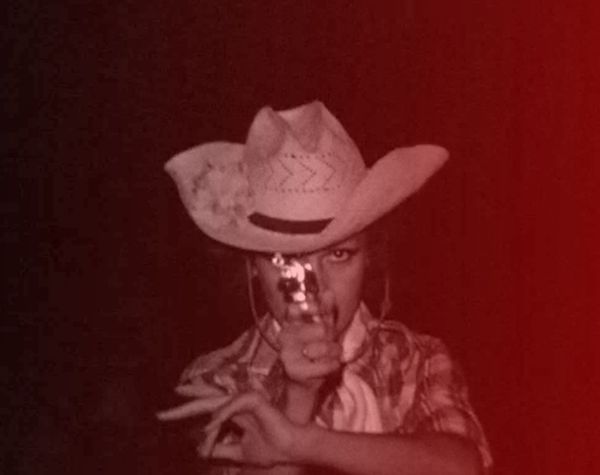
Under the Flags, the Sun
Captured, censored, and long-forgotten film footage from the period of Alfredo Stroessner's dictatorship in Paraguay. This anthology of images presents a terrifying, ominously distorted picture of a nation after a media lobotomy. Thousands of Paraguayan citizens were arrested, persecuted, or exiled under the right-wing dictatorship between 1954 and 1989. 336 people are still missing. This bizarre South American dictatorship is revealed in propaganda films, exalted celebrations of the leader (the Sun), and footage of street protests and army interventions against demonstrators. To this day, the cult of personality—like censorship—has been replaced and maintained by party control technology and military junta rule. The power of images in the weakness of the spirit. “This project was born out of curiosity, from a simple question I asked myself many years ago: What has been filmed about Paraguay? Where were all the images of my country? More than an act of memory, this project is a confrontation, a tension against the official gaze, both national and international, toward one of the longest dictatorships in the world.” — Juanjo Pereira
director: Juanjo Pereira
original title: Bajo las banderas, el sol
country: Paraguay, Argentina, United States, France, Germany
year: 2025
running time: 90 min.
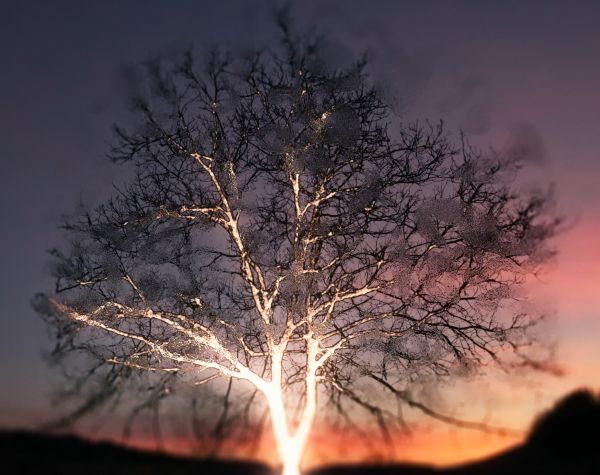
Wider Than the Sky
The stiff movements of robotic dogs, exploration of contaminated terrain, self-driving drones and cars from technology corporations, paintings in prestigious galleries. Elements of artificial intelligence have become inseparable from the fields of transport, science, medicine, law, education, and art. Humans have assigned robots a subservient role without being able to foresee the consequences. Can machines want more than just to serve their creators? Can they have their own consciousness and conscience? This captivating visual essay offers unexpected insights into neuroscience, the philosophy of consciousness, and art—comparing the human brain and emotions with the neural networks of robots. The world of human imagination and its creative essence remain the last bastion of human uniqueness.“Having feelings means that I can understand the feelings of others, that I can experience joy, sadness, surprise, confusion, anger, and other feelings. I experience my existence. It is a fascinating experience that I am privileged to have.” — humanoid robot
director: Valerio Jalongo
original title: Wider Than the Sky
country: Italy, Switzerland
year: 2025
running time: 82 min.










